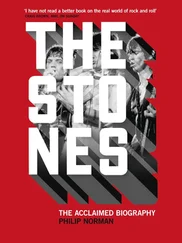He for his part had serious misgivings about joining a group of scruffy arty types so much his junior – especially after seeing their domestic arrangements. ‘[The flat] was an absolute pit which I shall never forget – it looked like it was bomb-damaged,’ he would recall. ‘The front room overlooking the street had a double bed with rubbish piled all round it [and] I’ve never seen a kitchen like it . . . permanently piled high with dirty dishes and filth everywhere . . . I could never understand why they carried on like this . . . It could not just have been the lack of money. Bohemian angst most likely.’
Despite having left school at the age of sixteen, Bill was just as intelligent and articulate as Mick or Brian. He soon realised that although the Rollin’ Stones might not be going anywhere in particular, their singer definitely was – if not necessarily in music. While Keith merely seemed like ‘a Teddy Boy who’d spit in his beer to ensure nobody drank it’ and had ‘no plans to work’, and Brian regarded music as an irreplaceable vocation, Mick talked often of becoming a lawyer or perhaps a journalist, as the LSE graduate Bernard Levin had done with spectacular success. At times, he did not even seem quite comfortable with his new first name. ‘He hated being called Mick,’ Bill remembers. ‘In his own eyes he was still Mike.’
He was keeping up his LSE studies despite the late nights and distractions, and that previous June had sat part one of his BSc degree, achieving just-respectable C grades in the compulsory subjects of economics, economic history and British government and the optional ones of political history and English legal institutions. Behind the mask of coolness and indifference, he worried that he was not making the most of his opportunities or justifying the investment that Kent County Council had made in him. His vague hankering for some kind of literary career was sharpened, that autumn, when his father became the Jagger family’s first published author. As the country’s leading authority on the sport, Joe edited and partially wrote a manual entitled Basketball Coaching and Playing in a series of how-to books issued by the prestigious house of Faber & Faber (which Mick’s fellow economics student Matthew Evans would one day run). B. Jagger’s opening chapter, ‘The Basketball Coach’, written in simple but forceful prose, set out principles his son would later employ in a somewhat different context. The successful coach, wrote B. Jagger, ‘must definitely possess . . . a sense of vocation, a dedication to the game, faith in his own ability, knowledge and enthusiasm’. Without these qualities, the team would be ‘an ordinary run-of-the-mill affair, rising to no great heights and probably keeping warm the lower half of some league table . . .’ The coach must train himself to develop ‘a keen analytical sense’ and view each game as ‘an endless succession of tactics’ dictated solely by him. ‘The players are for the whole time examples of [his] skill and ability . . . He must quickly eradicate weaknesses and use to the full the strong points of his players . . .’
The greatest pressure on Mick, as always, came from his mother. Eva Jagger still could not take his singing seriously, and protested with all her considerable might at its deleterious effect on his studies – and the high-level professional career that was supposed to follow. The Edith Grove flat so appalled her that she couldn’t bear to set foot inside it (unlike Keith’s down-to-earth mum, who came in regularly to give it a good clean-up). When Mick remained obdurate about continuing with the Stones, Eva telephoned Alexis Korner and in her forthright way demanded whether ‘Michael’, as she firmly continued to call him, really was anything special as a singer. Korner replied that he most definitely was. The unexpectedly public-school voice at the other end of the line pacified Eva but still did not convince her.
At LSE, Mick’s absences from lectures and tutorials were becoming more frequent, his need to copy fellow student Laurence Isaacson’s notes more urgent. Though only dimly aware of his other life with the Rollin’ Stones, Isaacson could not but notice the changes coming over that once-typical middle-class student. ‘He was still very quiet and unobtrusive when he did appear at college. But one day when he turned up, he’d had his hair streaked. He was the first bloke I ever knew who did that.’
WHEN CLEOPATRA SYLVESTRE caught Mick’s eye at the Marquee Club, she was seventeen and still attending Camden School for Girls. The paradox of these clubs dedicated to black music was that very few actual black people frequented them – and those who did tended to be predominantly male. More often than not, Cleo would find herself the only young black woman in the Marquee’s audience. Anyway, she was an eye-catcher: tall and lovely in an American rather than British or Caribbean way, and always wearing something outrageous like a pink leather miniskirt she had made for herself, or a bright orange wig.
Though she lived in a council flat in Euston, Cleo’s background was richly cosmopolitan. Her mother, Laureen Goodare, a well-known West End cabaret dancer during the Second World War, had had a long-time affair with the composer Constant Lambert. Her godfathers were Lambert and the MP, journalist and notorious homosexual Tom Driberg. Her close friend and frequent companion around the blues clubs was Judith Bronowski, daughter of the mathematician, biologist and television pundit Dr Jacob Bronowski.
Cleo had first seen Mick when he was still with Blues Incorporated; he would smile and say hello, but it wasn’t until after the Rollin’ Stones started that he came over and spoke to her. Still experimenting with their sound and look, the band had thought of using black female back-up singers like Ray Charles’s Raelettes and Ike and Tina Turner’s Ikettes. Mick asked Cleo if she could find two black friends and audition as a backing trio, to be known as the Honeybees.
The audition, at the Wetherby Arms pub in Chelsea, was a disaster. Cleo could find only one other candidate for the trio, a clubbing companion named Jean who proved to be tone-deaf. Though Cleo herself had a good voice, the idea of a nine-strong, mixed-race-and-gender Rollin’ Stones progressed no further. But from then on she became a special friend to the band and, increasingly, a very special one to Mick.
She and Jean were their most faithful followers – groupies would be too crude – trailing them from places they now easily packed, like the Ealing Club, to those where they still struggled against anti-rock ’n’ roll prejudice, like Ken Colyer’s Studio 51 Club in Great Newport Street. ‘Sometimes when they played to only about nine people, Brian would literally be in tears,’ Cleo recalls. ‘But Mick was always the optimistic one, who said they had to keep going and they’d win everyone over in the end.’
She and Mick began dating with all the conventionality – and chasteness – that word used to imply, during the brief intervals between his college hours, her school ones and the Stones’ nightlife. ‘We’d go to the cinema,’ Cleo remembers. ‘Once, Mick got tickets for the theatre, but for some reason we never made it there. He rang me up one day and asked me to join Keith and him in a boat on the lake in Regent’s Park. A few times, I met him at LSE, where he used to work in the library.’ Unluckily, she already had a boyfriend, who could not but know what was going on since he shared a flat with Mick’s sometime stage colleague, Long John Baldry. Their break-up was an early example of the threat Mick would later pose to so many men’s masculinity. When Cleo went to her ex’s flat to collect some records she’d left there, he was pressing clothes on an ironing board. He thrust the hot iron into her face so it burned her forehead, and hissed, ‘When you next see Mick, give him that for me.’
Читать дальше












